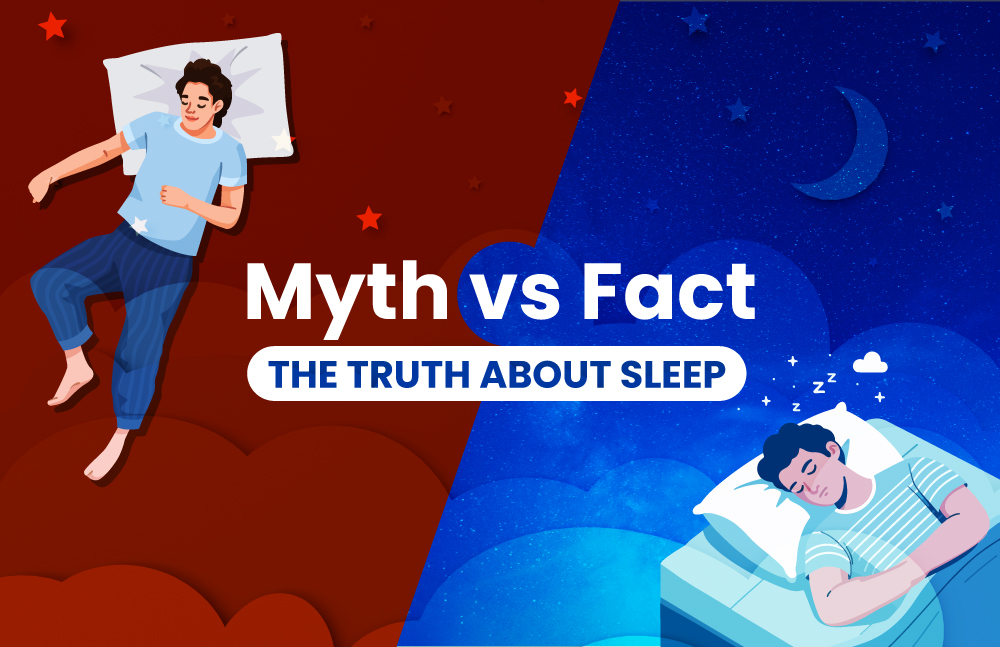
9 Common Sleep Myths You Should Stop Believing
Introduction
We often hear advice about sleep from friends, family, or even the internet—but not all of it is true. Many common beliefs about sleep are actually myths that can harm your rest and health. In this blog, we’ll break down nine of the most widespread sleep myths, reveal the facts behind them, and help you understand how to truly get the restorative sleep your body needs.
Table of Content
Myth 1: I need 8 hours of sleep each night
Myth 2: If I nap during the day, I won’t sleep at night
Myth 3: My body naturally adapts to less sleep
Myth 4: Alcohol before bed helps me sleep bette
Myth 5: Immediate sleep is a sign of healthy sleep
Myth 6: Sleeping with a light on is harmless
Myth 7: Insomnia means difficulty falling asleep
Myth 8: Your brain rests during sleep
Myth 9: Regular snoring is normal
1.
Myth: I need 8 hours of sleep each night
Fact: Your sleep needs depend on age, health, and daily activity.
In general, 8 hours is a good benchmark. The American Academy of Sleep Medicine (AASM) recommends 7 to 9 hours for adults, but it’s not a one-size-fits-all rule. Your age, sleep patterns, physical health, stress levels, and daily activity all affect how much sleep you truly need.
Some adults feel rested after 6.5 hours, while others may require more than 9. The key is listening to your body—if you wake up refreshed and function well throughout the day, you are likely getting the right amount of rest.
2.
Myth: If I nap during the day, I won’t sleep at night
Fact: A short, well-timed nap won’t hurt your nighttime sleep.
Napping is not the enemy of good sleep, especially when done right. A power nap of 10–30 minutes in the early afternoon can boost your energy, mood, and focus.
The problem arises only if you nap too long or too late in the day, which can make it harder to fall asleep at bedtime. So if you are feeling a dip in energy, do not hesitate to rest just be mindful of timing and duration.
3.
Myth: My body naturally adapts to less sleep
Fact: Your body cannot fully adjust to chronic sleep deprivation.
You might feel like you are managing fine on 5 to 6 hours of sleep, but over time, the effects of sleep loss build up. Concentration, memory, and mood take a hit. More importantly, your risk for chronic conditions like heart disease, high blood pressure, diabetes, and obesity increases.
Your body needs consistent, restorative sleep to function properly—even if you have learned to "get by" without it.
4.
Myth: Alcohol before bed helps me sleep better.
Fact: Alcohol disrupts sleep cycles, preventing restful sleep.
Alcohol may make you sleepy at first, but it disrupts REM sleep—the stage essential for mental and emotional recovery. As it’s metabolized, it causes frequent awakenings, lighter sleep, and reduced restfulness.
It also suppresses melatonin and relaxes throat muscles, increasing the risk of snoring and sleep apnea. A nightcap may do more harm than good.
5.
Myth: Immediate sleep is a sign of healthy sleep.
Fact: Immediate sleep can signal sleep deprivation.
If you drift off the second your head hits the pillow, it might seem like you are a champion sleeper. But in many cases, it’s a red flag for sleep deprivation. Ideally, it should take about 10–20 minutes to fall asleep. Instant sleep means usually indicates your body is severely overtired.
6.
Myth: Sleeping with a light on is harmless
Fact: Light exposure interferes with your natural sleep rhythm.
Your body’s internal clock is sensitive to light. Even dim lighting can suppress melatonin production, the hormone that helps regulate sleep. Over time, sleeping with lights on may reduce sleep quality and make it harder to feel rested.
To get the best sleep, keep your bedroom as dark as possible by using blackout curtains, sleep masks, and dimming screens can all help.
7.
Myth: Insomnia means difficulty falling asleep
Many people think insomnia just means lying awake at night unable to doze off. In reality, it’s much broader. If you fall asleep easily but wake up multiple times or too early and can’t get back to sleep that’s insomnia too. It can also involve feeling unrefreshed after sleep, even if you were technically asleep for several hours. Recognizing all forms of insomnia is important for seeking the right treatment.
8.
Myth: Your brain rests during sleep
Fact: Your brain stays highly active while you sleep.
While your body rests, your brain works hard. It processes memories, consolidating learning, removing toxins, and regulating emotions. REM sleep, in particular, is when your brain becomes almost as active as when you're awake. So while your body rests, your brain works hard to support your overall health and mental function.
9.
Myth: Regular snoring is normal
Fact: Snoring can signal sleep apnea.
Occasional snoring may be harmless, but regular or loud snoring can point to obstructive sleep apnea (OSA). This condition interrupts breathing, causes frequent awakenings, and prevents deep, restorative sleep. Persistent snoring should not be ignored, it may require medical evaluation.
Conclusion
Sleep is one of the most vital pillars of good health, yet it’s often surrounded by myths that can mislead us. By understanding the truth behind these common misconceptions, you can make better choices to improve your sleep quality, boost your energy, and protect your long-term health. Remember, good sleep is not about following rigid rules—it’s about listening to your body, creating healthy habits, and giving yourself the rest you truly need.


